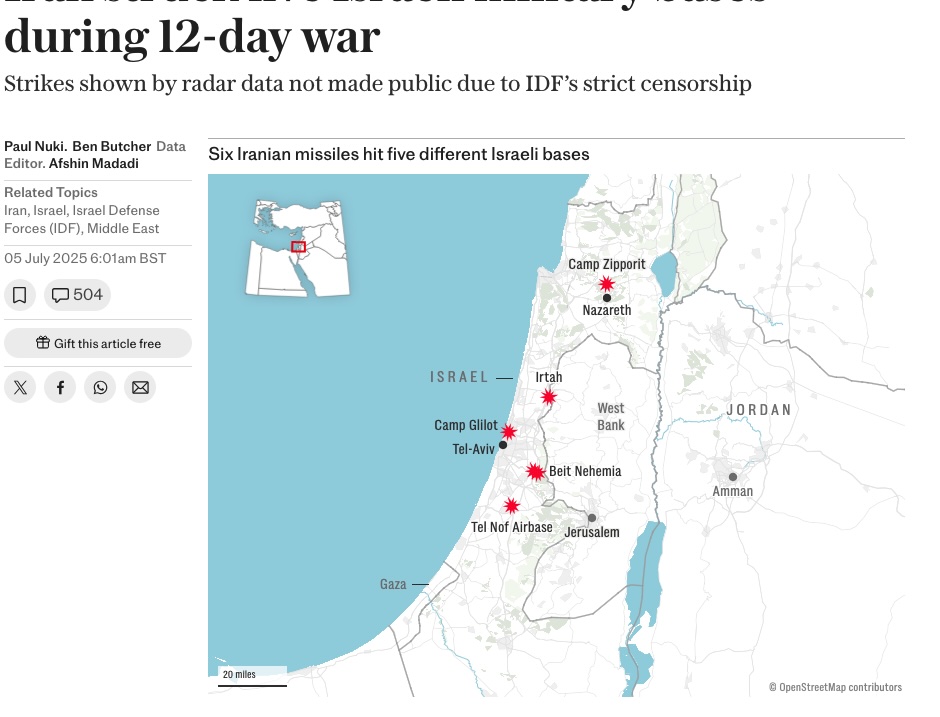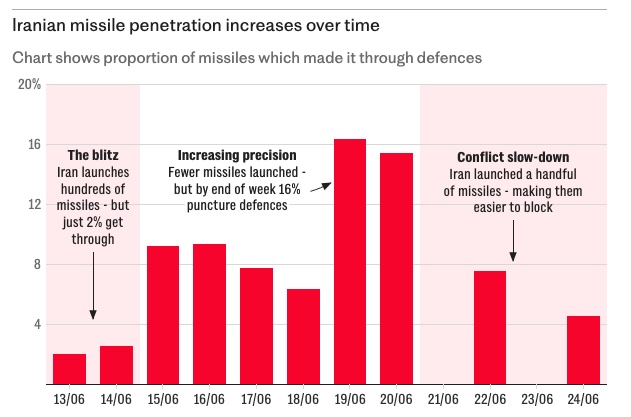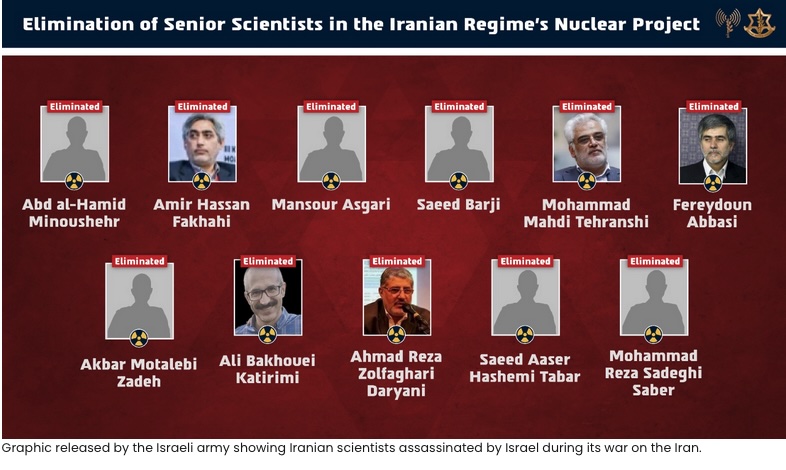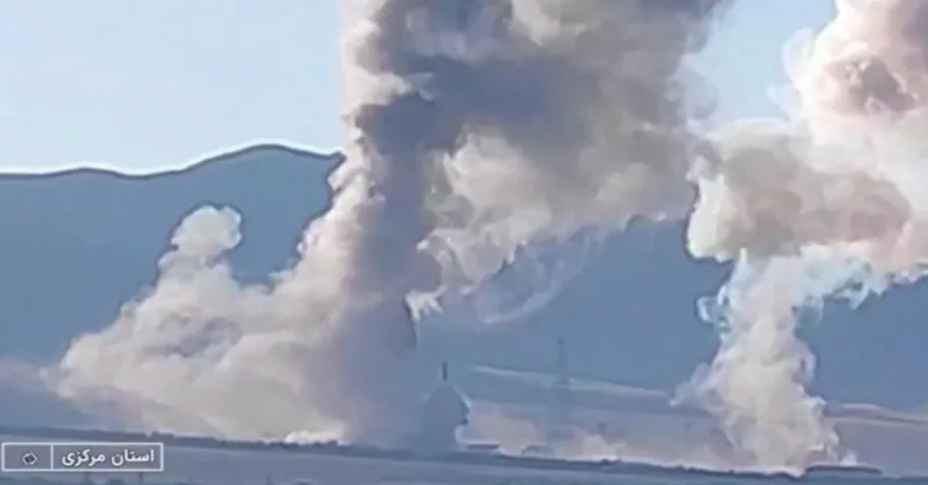On July 1, Sina Toossi published an important piece in Foreign Policy mag in which he argued that the “12-day war” that the US-Israeli alliance launched against Iran on June 13 had backfired, primarily in terms of its nuclear-nonproliferation goals. He wrote:
There is no question that Israel achieved notable tactical successes, inflicting serious damage on Iran’s military command and scientific infrastructure. But … based on available evidence, Netanyahu’s core goals—undermining Iran’s deterrence and meaningfully rolling back the elements of its nuclear program that pose the greatest proliferation risk—remain unmet.
One of the most significant failures lies in the nuclear file…While Trump administration officials have insisted that the strikes set Iran’s program back by years, early U.S. and European intelligence assessments suggest otherwise.
On July 8, Israeli military/intel analyst Moty Kanias followed up with this analysis, along similar but notably broader lines. Here were his heading and subhead:
Israel Won the War It Fought. But Iran Emerged Victorious in the One That Mattered / Each side fought for different goals and claimed different victories. Israel did manage to achieve a few of its objectives; but Iran maintained its defensive position on everything it really needed
Kanias wrote this about what Iran achieved in the war:
in addition to keeping its 408 kilogram of uranium safe from combined U.S. and Israeli attacks, they also managed to hold on to control while improving their standing on the global stage. Iran’s ability to absorb punishment, control the story and avoid collapse may be its biggest win.
I agree with these two guys’ bottom-line analysis on the outcome of the war. Back on June 26, I wrote this:
[A}fter eleven days it was a mutually hurting stalemate. But there have been several indications that Israel’s society and economy were much closer to collapse than Iran’s. (Hence, Trump’s rush to the ceasefire.)
On July 3, I expanded some on that analysis in the livestream conversation I had with Electronic Intifada’s Ali Abunimah and Nora Barrows-Friedman. I noted there that one of the Israelis’ key goals in launching the attack had been to re-establish the “credibility” of Israel’s power of “deterrence”, which had been so severely collapsed by the Hamas-led attacks of October 7, 2023.
I concluded that the Israelis:
have not succeeded either in toppling the Iranian … government, and they have not succeeded in re-establishing the credibility of Israel’s military deterrence. So, from that point of view, it has actually been a loss for the Israelis.
An early, still unedited transcript of that livestream can be found here.
I was building in that livestream on some of the (very tentative) early reports that had started to appear in Haaretz about the extent of the damage that Iran’s missile strikes– which continued in targeted, full force until the very last day of the war– had inflicted on several densely packed urban neighborhoods in Israel.
It is always crucial to underline, as I did in the livestream convo, the extent to which all reporting from Israel, by local and international journos, is subjected to the country’s military censorship. Reporting on the actual location and impact of successful Iranian missile strikes was among the most tightly censored items of news during the war.
The best reporting on these matters that I’ve seen to date, in any mainstream Western media outlet, has been this report, published July 5, in the London Daily Telegraph. It included these graphics showing location of the six Iranian missile strikes that hit five crucial Israeli military sites during the war, and the fact that Iranian missiles continued to penetrate the combined US-Israeli missile-defense systems until the very last days of the war:


The Telegraph team quoted Raviv Drucker of Channel 13, as saying:
There were a lot of [Iranian] missile hits in IDF bases, in strategic sites that we still don’t report about to this day… It created a situation where people don’t realise how precise the Iranians were and how much damage they caused in many places.
The Iranian side suffered very heavy losses, too, of course– both from the apparently very “smart” and targeted assassination ops the Mossad was able to undertake against leading Iranian commanders and nuclear scientists, from the very first hours of the war onwards, and from the aerial bombardments the Israelis were able to sustain in successive waves throughout the war. (Those bombardments were possible only because of the very active cooperation and support they received from the US “Centcom” as their pilots flew to Iran across the lengthy “air bridge” Centcom established for them across Jordan and Iraq.)
This July 4 piece in The Cradle provided extensive information about the extent of the Israeli assassinations. It contains these somber graphics:


Assassinating scientists is an act that clearly contravenes international humanitarian law, as is assassinating even military commanders who are not on duty. Reportedly a high proportion of those whom Israel assassinated in the wee hours of June 13 were killed at home in their beds, along with their– in some cases, very numerous– family members. Recall that on June 12-13, everyone involved in the Iranian government’s still-ongoing, by then two-month-old negotiations with the U.S. government over nuclear concerns was still confidently expecting the next round of negotiations to take place, as planned, on June 15.
… Anyway, as I’ve noted previously, despite the extent of those killings of key Iranian commanders the Iranian command-and-control system was not fatally crippled. Indeed, starting within hours of Israel’s initiation of the war, it proved capable of responding to Israel’s attacks in a smart, targeted, and coherent way, with the results that the Daily Telegraph, Raviv Drucker, and others were able to describe.
I’ve been pulling together these resources here as a way of collating them for my own future use. But also because I want to quickly reflect a little more on the actual extent of the “backfire” that Sina Toossi was writing about. My current assessment is as follows:
- Yes, inasmuch as the goal of the US-Israeli attack on Iran was aimed at destroying or significantly degrading Iran’s capability to develop its own nuclear-weapons arsenal, then it was only very partially successful. But at the same time, by busting right through all the norms and procedures of the NPT and its guardian body the IAEA, the US-Israeli attack very severely downgraded the integrity of those bodies and therefore their ability to supervise Iran’s nuclear-tech program going forward. Hence, Toossi’s argument about a “backfire” at the nuclear-nonproliferation level, was correct. (Crucial also to note in this regard both that Iran still states that it does not seek to weaponize its nuclear program, and that Israel itself has a well-known nuclear arsenal that is completely outside the reach of those international bodies.)
- However, we should certainly question whether nuclear-nonproliferation concerns were the only, or even the main, goals of the US-Israeli attack. Here, it is possible to suggest that the goals of those two “Attack Axis” members may have differed some. Maybe, for the U.S. side, the nuclear-nonproliferation goal was central. (As Pres. Trump seems to have focused on, whether his claims about the Axis’s achievement in this regard were accurate or not. And nearly all the Western media has centered its coverage of the war on that goal, as we know.) However, I’d like to propose that for Israel this was not the main goal of the attack. Rather, the main goal was the “re-establishment of Israeli deterrence” through a very public demonstration of Israel’s reach, its capabilities in intel and war-fighting, and its willingness/eagerness to use those capabilities to great destructive effect. At this level, we would definitely have to describe the outcome of the war as a flub, a damp squib, or a failure.
- Since this war was the culmination of many years– perhaps even decades– of detailed Israeli and Israeli-US planning, then that means that it cannot be repeated at anything like that level of reach, sophistication, or effect any time within the next few years. Which means that the flub/failure of June 2025 will have long-lasting effects. Consider these two aspects of what happened: (A) The Israelis “shot their wad” in terms of disclosing/using numerous previously tightly held capabilities that had taken their military and their special ops people many years to build up; and (B) The Iranians, having survived that assault with the integrity of their political and military-ops systems still well intact and well tested, have also been hurrying to upgrade numerous systems whose weaknesses and vulnerabilities had been revealed in June. These have included their sat-nav systems and their air-defense systems.
- For the Israelis, the re-establishment of the “credibility” of their military-deterrent capability has been urgent for numerous broader political/strategic reasons. One has been to reassure their own national population, so traumatized after October 7, that this deterrent capability has been re-established and can henceforth keep them safe. Another, as Ali Abunimah noted during our EI livestream, has been to “sell” this capability to the Arab states of the Gulf, as proving to them that an Abraham Accords-based alliance against Iran is the best guarantor of their own survival. Another big backfire here, it seems. And a third goal of the Israelis was to prove once again to the United States that the Israeli military is always a willing attack dog well able to advance U.S. interests throughout West Asia, and further afield…
On this latter topic, I have written reams and reams over the years on the ever-shifting military dimension of the U.S.-Israeli relationship, most recently here, last October. It feel too early, right now, to reach any firm conclusions about the effects the June attack on Iran will have on this relationship.
Trump, for his own reasons, has remained super-eager to portray the results of the very last phase of the war– that is, his own decision to use Washington’s own B-2 bombers to attack two sites in Iran on the night of June 21-22– as a total success. (And the Iranians, for the most part, have seemed happy to let him continue crowing about that success– even as they pursue their own steps, as noted above, to repair and upgrade their defensive capabilities in many dimensions. Many of those steps have been taken, I should note, in close coordination with China, and to some extent Russia.)
But how did Trump and his people view the outcome of the preceding nine days of the attack on Iran– the period in which Israel was the party taking the operational lead? Quite evidently, around 7-9 days into the war, the Americans saw that Israel had not succeeded in halting the continued barrages of Iranian drone and missile attacks… And that to prevent further catastrophes in the Israeli-U.S. position stemming from the Iranians’ proven ability to “use up” large numbers of very expensive U.S. and Israeli interceptor missiles, then the war needed to be brought to a halt… And the best way to do that, from Trump’s perspective, was to intervene directly in the war, with the extremely splashy show of force of June 21-22.
We saw the angry dressing down Trump gave the Israelis shortly after his (quite unilateral) announcement of the ceasefire, when he told the world he had “told” the Israelis to call back the pilots of the last wave of bombers they had sent over toward Iran…
We have not yet seen him deliver a démarche of anything like that force to Netanyahu regarding the latter’s continued dedication to pursuing the genocide in Gaza. (A goal that quite posssibly, Pres. Trump actually shares?)
…All of these developments are having, of course, very large impacts on the survival of the Palestinians of Gaza, on the balance of power throughout West Asia, and on the global power balance and the integrity of the international system as a whole.
It now seems clear to me that that fateful attack that the US-Israeli axis launched against Iran on June 13 proved to be a significant “backfire”/own goal for the Israelis at many different levels. It may well soon prove also to be a serious backfire for Pres. Trump’s administration, and for the dominant position that U.S./Western power has long enjoyed within the global system as a whole.


